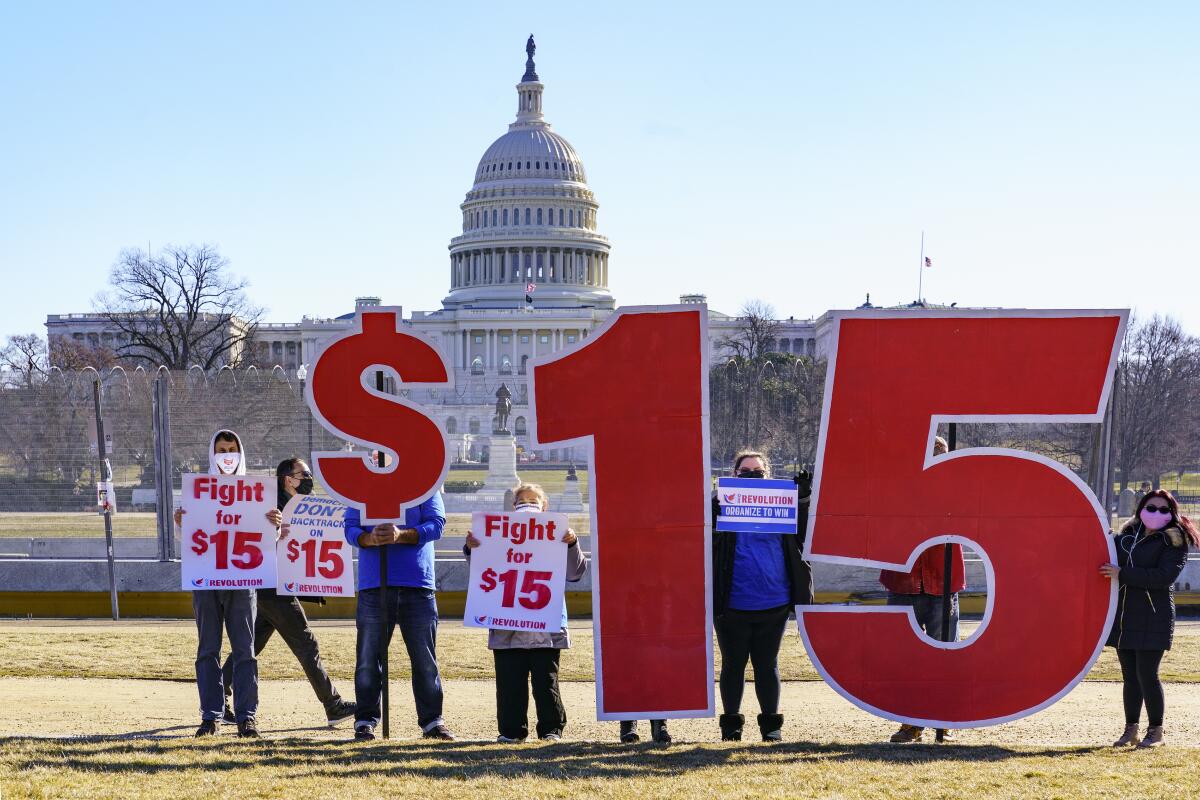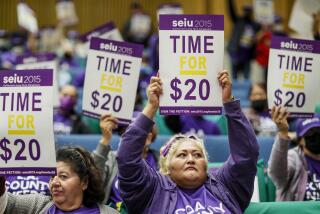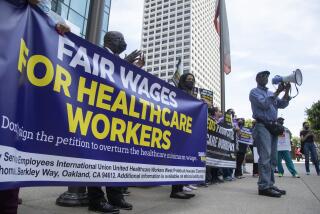Minimum wage hike all but dead in big COVID relief bill

- Share via
WASHINGTON — Democrats’ efforts to include a minimum wage increase in their $1.9-trillion COVID-19 relief bill seemed all but dead Monday as Senate leaders prepared to begin debate on their own version of the House-passed aid package.
Top Democrats abandoned a potential amendment threatening tax increases on big companies that don’t boost workers’ pay to certain levels, Senate aides said. Four days after the chamber’s parliamentarian said Senate rules forbid inclusion of a straight-out minimum wage increase in the relief measure, Democrats seemed to have exhausted their most realistic options for quickly salvaging the pay hike.
“At this moment, we may not have path, but I hope we can find one” for pushing the federal pay floor to $15 an hour, Assistant Majority Leader Richard J. Durbin (D-Ill.) said.
Senate Democrats hope to unveil their version of the broad relief package and begin debate as early as Wednesday. Congressional leaders want to send President Biden the legislation combating the pandemic and bolstering the economy by March 14, the date emergency jobless benefits that lawmakers approved in December expire.
The bill is Biden’s biggest early legislative priority. It looms as an initial test of his ability to unite Democrats in the Senate — where the party has no votes to spare — and risks lasting damage to his influence should he fail. Republicans are strongly against the legislation and could well oppose it unanimously, as House GOP lawmakers did when that chamber approved the bill early Saturday.
Biden discussed the relief bill Monday in a virtual meeting with nine Senate Democrats, including Joe Manchin III of West Virginia, an opponent of the $15 hourly target. A White House statement said the group was “united in the goal of quickly passing a significant package that reflects the scope of the challenges our country is facing.”
The Senate is divided 50-50 between the parties, with Vice President Kamala Harris able to cast only tie-breaking votes. Under streamlined rules the Democrats are using, they can approve the legislation with just 51 votes.
The overall bill would provide $1,400 payments to individuals plus hundreds of billions of dollars for schools and colleges, COVID-19 vaccines and testing, mass transit systems, renters and small businesses. It also has money for child care, tax breaks for families with children and states willing to expand Medicaid coverage for low-income residents.
Democrats are considering several changes in the House measure, but they seem modest compared with dropping the minimum wage increase. One top aide said the bill the Senate initially debates won’t have the minimum wage provision in it, saying the language would have pushed the bill over budget-mandated spending limits, violating Senate rules.
Senate Democrats may reshape the $350 billion the bill provides for state and local governments. They also might extend its fresh round of emergency unemployment benefits, which would be $400 weekly, through September instead of August, as the House approved.
The parliamentarian’s interpretation of Senate rules could force other changes as well. These might include dropping or altering provisions in the House bill providing billions of dollars to help some struggling pension plans and to help people who’ve lost jobs afford health insurance.
The House-approved minimum wage language would gradually raise the federal floor to $15 an hour by 2025, more than double the $7.25 in place since 2009.
After the parliamentarian said that provision would have to be deleted, Sens. Bernie Sanders (I-Vt.) and Ron Wyden (D-Ore.) said they were working on plans to increase taxes on large corporations that don’t meet certain levels for workers’ pay. Sanders is chief Senate sponsor of the $15 plan, while Wyden is chair of the tax-writing Senate Finance Committee.
But three Senate aides, speaking on condition of anonymity to describe internal discussions, said Monday that party leaders were dropping those proposals.
It was always questionable whether pressuring companies with tax increases would win enough Democratic support to survive. The White House didn’t endorse the tax proposals, which would have affected only a fraction of workers paid the minimum wage.
Raising the minimum has broad support among Democrats. But while it’s embraced passionately by the party’s progressives, at least two Senate moderates — Manchin and Kyrsten Sinema of Arizona — have voiced opposition to including it in the broader relief measure, wounding its prospects and fostering tensions within the party.
The tepid Democratic reaction to the tax plan has left the party looking at potentially pushing a minimum wage increase in future legislation, where it could well face enough GOP opposition to kill it.
Democrats must now decide “how we do minimum wage as part of another piece of legislation or on its own,” Sen. Richard Blumenthal (D-Conn.) said.
As an alternative, progressives want Senate Democrats to simply overrule the parliamentarian and include the pay raise anyway, or to eliminate Senate filibusters — procedural delays that let a minority party kill legislation that lacks at least 60 votes.
But those ideas seem to lack enough Democratic support to succeed. Senate moderates are wary of erasing procedures that the party has used in the past, and could use again, to protect its priorities when it is in the minority.
Among those who’ve long supported retaining the filibuster is Biden, who served nearly four decades in the Senate.
“The president’s view on the filibuster is well known. He has not changed that point of view,” White House press secretary Jen Psaki said Monday.
Despite seeming White House opposition, nearly two dozen House progressives tried pressuring Biden to have Harris join Democratic senators and vote to override the parliamentarian and include the increase in the bill anyway.
“Outdated and complex” Senate rules “must not be an impediment to improving people’s lives,” the House members, led by Rep. Ro Khanna (D-Fremont), wrote in a letter to Biden and Harris. “You have the authority to deliver a raise for millions of Americans.”
More to Read
Sign up for Essential California
The most important California stories and recommendations in your inbox every morning.
You may occasionally receive promotional content from the Los Angeles Times.










